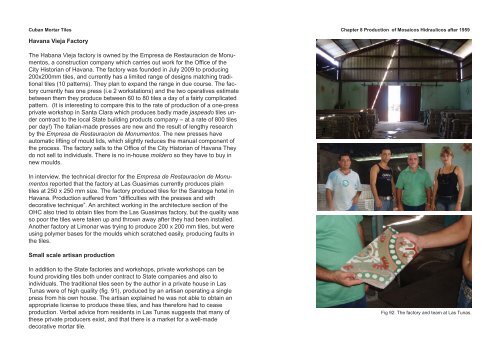Cuban Mortar Tiles - infogram.co.uk > Home
Cuban Mortar Tiles - infogram.co.uk > Home
Cuban Mortar Tiles - infogram.co.uk > Home
You also want an ePaper? Increase the reach of your titles
YUMPU automatically turns print PDFs into web optimized ePapers that Google loves.
<strong>Cuban</strong> <strong>Mortar</strong> <strong>Tiles</strong> Chapter 8 Production of Mosai<strong>co</strong>s Hidrauli<strong>co</strong>s after 1959<br />
Havana Vieja Factory<br />
The Habana Vieja factory is owned by the Empresa de Restauracion de Monumentos,<br />
a <strong>co</strong>nstruction <strong>co</strong>mpany which carries out work for the Offi ce of the<br />
City Historian of Havana. The factory was founded in July 2009 to producing<br />
200x200mm tiles, and currently has a limited range of designs matching traditional<br />
tiles (10 patterns). They plan to expand the range in due <strong>co</strong>urse. The factory<br />
currently has one press (i.e 2 workstations) and the two operatives estimate<br />
between them they produce between 60 to 80 tiles a day of a fairly <strong>co</strong>mplicated<br />
pattern. (It is interesting to <strong>co</strong>mpare this to the rate of production of a one-press<br />
private workshop in Santa Clara which produces badly made jaspeado tiles under<br />
<strong>co</strong>ntract to the local State building products <strong>co</strong>mpany – at a rate of 800 tiles<br />
per day!) The Italian-made presses are new and the result of lengthy research<br />
by the Empresa de Restauracion de Monumentos. The new presses have<br />
automatic lifting of mould lids, which slightly reduces the manual <strong>co</strong>mponent of<br />
the process. The factory sells to the Offi ce of the City Historian of Havana They<br />
do not sell to individuals. There is no in-house moldero so they have to buy in<br />
new moulds.<br />
In interview, the technical director for the Empresa de Restauracion de Monumentos<br />
reported that the factory at Las Guasimas currently produces plain<br />
tiles at 250 x 250 mm size. The factory produced tiles for the Saratoga hotel in<br />
Havana. Production suffered from “diffi culties with the presses and with<br />
de<strong>co</strong>rative technique”. An architect working in the architecture section of the<br />
OHC also tried to obtain tiles from the Las Guasimas factory, but the quality was<br />
so poor the tiles were taken up and thrown away after they had been installed.<br />
Another factory at Limonar was trying to produce 200 x 200 mm tiles, but were<br />
using polymer bases for the moulds which scratched easily, producing faults in<br />
the tiles.<br />
Small scale artisan production<br />
In addition to the State factories and workshops, private workshops can be<br />
found providing tiles both under <strong>co</strong>ntract to State <strong>co</strong>mpanies and also to<br />
individuals. The traditional tiles seen by the author in a private house in Las<br />
Tunas were of high quality (fi g. 91), produced by an artisan operating a single<br />
press from his own house. The artisan explained he was not able to obtain an<br />
appropriate license to produce these tiles, and has therefore had to cease<br />
production. Verbal advice from residents in Las Tunas suggests that many of<br />
these private producers exist, and that there is a market for a well-made<br />
de<strong>co</strong>rative mortar tile.<br />
Fig 92: The factory and team at Las Tunas.



